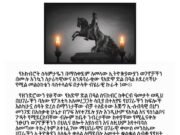Gerba is a leader of the Oromo Federalist Congress, a political party that represents one of the country’s largest ethnic groups. With estimated numbers of about 30 million, the Oromo make up about a third of Ethiopia’s population.
In 2011, Gerba was arrested after meeting with Amnesty International researchers and sent to prison on what he calls trumped up terrorism charges, often used in Ethiopia against political dissidents. In court he made remarks that have been widely circulated in Ethiopia and beyond: “I am honored to learn that my non-violent struggles and humble sacrifices for the democratic and human rights of the Oromo people, to whom I was born without a wish on my part but due to the will of the Almighty, have been considered a crime and to be unjustly convicted.”
Gerba was released from jail this spring in advance of President Obama’s July visit to Ethiopia. A soft spoken man, who seemed exhausted by his prison ordeal and his numerous appearances at U.S. universities and think tanks, Gerba tells NPR that Obama’s trip sent all the wrong messages.
“He [Obama] shouldn’t have shown any solidarity with that kind of government, which is repressive, very much authoritarian and very much disliked by its own people,” Gerba says.
Since Ethiopia’s ruling party and its allies control all of parliament, his party doesn’t have a voice, he says. What’s more, he says, his people are being pushed off their land by international investors.
“The greatest land grabbers are now the Indians and Chinese …. there are Saudi Arabians as well,” he says, adding that many families are being evicted and losing their livelihoods.
Gerba says those who do get jobs are paid a dollar a day, which he describes as a form of slavery. He is urging the U.S. to use its aid to Ethiopia as leverage to push the government to give workers more rights and allow people to form labor unions.
Gerba’s case has been featured in the State Department’s annual human rights reports. He describes himself as a Christian who believes in non-violence and says he spent his four years in prison pouring over the sermons and speeches of Martin Luther King and translating them into the Oromo language for a book that he hopes to see published. The title: “I Had A Dream.”
Bekele Gerba is not sure what he will face when he returns home from the U.S. When he was jailed, his wife, a high school teacher, lost her job. His family has struggled financially and psychologically.
“Nobody is actually sure in Ethiopia what will happen to him anytime,” he says. “Anytime, people can be arrested, harassed or killed or disappeared.”
Still, he plans to return home next week. He’s expected to return to his job at the Foreign Languages Department at Addis Ababa University.

























